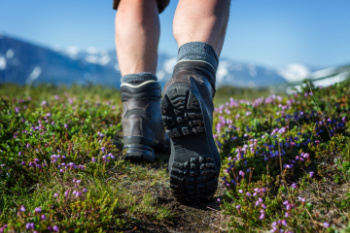
Choosing the right hiking shoes is important for both comfort and safety on the trail. When picking your hiking footwear, focus on protection, comfort, and weight. Your shoes should protect your feet from cuts and environmental damage and prevent blisters even after long hikes. Lightweight shoes help to conserve energy, making each step easier. While high-cuff boots are thought to offer ankle support, they often don't make a significant difference and may increase the risk of ankle rolls. Experts suggest performing strengthening exercises as an effective way to improve ankle stability. Breathable shoes allow your feet to dry quickly, which reduces the chance of blisters. Waterproof shoes can become heavy and waterlogged, making your hike more strenuous. Don’t overlook the importance of good socks. Seamless, cushioned wool socks are ideal, providing both durability and quick drying. Hiking shoes combine the best aspects of boots and trail runners, offering a balance of protection, comfort, and durability. They tend to last longer and provide the necessary support while being lighter and more flexible than traditional boots. If you experience foot pain after hiking, it is suggested that you make an appointment with a podiatrist for an exam and treatment.
It is important to find shoes that fit you properly in order to avoid a variety of different foot problems. For more information about treatment, contact Dr. Michael D. Garvin from Florida. Our doctor will treat your foot and ankle needs.
Proper Shoe Fitting
Shoes have many different functions. They cushion our body weight, protect our feet, and allow us to safely play sports. You should always make sure that the shoes you wear fit you properly in order to avoid injuries and deformities such as: bunions, corns, calluses, hammertoes, plantar fasciitis, stress fractures, and more. It is important to note that although a certain pair of shoes might be a great fit for someone else, that doesn’t mean they will be a great fit for you. This is why you should always try on shoes before buying them to make sure they are worth the investment. Typically, shoes need to be replaced ever six months to one year of regular use.
Tips for Proper Shoe Fitting
- Select a shoe that is shaped like your foot
- Don’t buy shoes that fit too tight, expecting them to stretch to fit
- Make sure there is enough space (3/8” to ½”) for your longest toe at the end of each shoe when you are standing up
- Walk in the shoes to make sure they fit and feel right
- Don’t select shoes by the size marked inside the shoe, but by how the shoe fits your foot
The shoes you buy should always feel as good as they look. Shoes that fit properly will last longer, feel better, and improve your way of life each day.
If you have any questions, please feel free to contact our offices located in Port St. Lucie, FL . We offer the newest diagnostic and treatment technologies for all your foot care needs.
